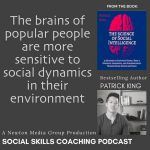Social Skills Training for Adults: 10 Best Activities + PDF
 Being socially awkward is not just a problem kids face; adults can battle with social skills too, leading to anxiety and even serious phobias.
Being socially awkward is not just a problem kids face; adults can battle with social skills too, leading to anxiety and even serious phobias.
Struggles with social skills in adulthood can cause avoidance of social situations and interfere with building long-lasting relationships.
Providing social skills training to clients with anxiety, fear of public speaking, and similar issues could ensure more optimal functioning.
This article provides strategies and training options for the development of various social skills. Several resources to help target specific struggles related to the development of social skills in adults are also included, and the approaches can be tailored to improve social responses in specific domains.
Before you continue, we thought you might like to download our three Positive Psychology Exercises for free. These science-based exercises will explore fundamental aspects of positive psychology including strengths, values, and self-compassion, and will give you the tools to enhance the wellbeing of your clients, students, or employees.
This Article Contains:
Social Skills Training for Adults Explained
Social skills training includes interventions and instructional methods that help an individual improve and understand social behavior. The goal of social skills training is to teach people about verbal and nonverbal behaviors that are involved in typical social interactions (“Social,” n.d.).
Social skills training is usually initiated when adults have not learned or been taught appropriate interpersonal skills or have trouble reading subtle cues in social interactions. These instances can also be associated with disorders that impede social development, such as autism.
Therapists who practice social skills training first focus on breaking down more complex social behaviors into smaller portions. Next, they develop an individualized program for patients, depending on what social skills they need to work on, and gradually introduce those skills to their patients, building up their confidence through gradual exposure.
For instance, a person who has trouble making eye contact because of anxiety in social situations might be given strategies to maintain eye contact by the therapist. Eye contact is the foundation for most social interaction, and interventions will often start with improving the individual’s ability to maintain eye contact.
During therapy, other challenging areas will be identified such as starting or maintaining a conversation or asking questions. Each session will focus on different activities that typically involve role-play and sometimes will take place in a group setting to simulate different social experiences.
Once confidence has been built up during therapy or social skills group settings, these social skills can be brought into daily life.
Useful assessments: Tests, checklists, questionnaires, & scales
Before engaging your clients in social skills interventions or any type of therapeutic intervention, it is important to determine if social skills therapy is a good approach to help them with their current situation.
The Is Social Skills Training Right for Me? checklist is a self-assessment opportunity for clients to determine if social skills therapy is appropriate for their specific situation or if another approach will be more beneficial.
However, self-assessment activities can sometimes be unreliable, as the individual might not fully understand the treatment models that are available to them. Additionally, if a client has issues with social skills, they may not be aware of their deficiencies in social situations.
In these situations, therapists should ask clients about the issues they are having and encourage them to engage in self-questioning during sessions.
9 Questions to ask your clients
Prior to starting social skills training or activities, the therapist and client should narrow down which areas need help. A therapist can do this by asking the client a series of questions, including:
- Where do you think you are struggling?
- Are there any social situations that make you feel anxious, upset, or nervous?
- Do you avoid any specific social situations or actions?
- Have you ever had anyone comment on your social behavior? What have they said?
- What do you think will help you improve the skills you are struggling with?
Clients can also ask themselves some questions to determine if the social skills therapy process is right for them.
These questions can include:
- What aspects of my life am I struggling with?
- Are there specific social situations or skills that I struggle with?
- Do I have trouble keeping or maintaining relationships with friends, family members, and coworkers?
- Am I avoiding specific social situations out of fear?
Getting clients to ask these questions will help determine if this process will benefit them. Having clients “buy in” to the process is important, to ensure that the approach is right for them and increase the likelihood that they will be engaged to complete activities with a reasonable degree of efficacy.
Social Skills Coaching: 2 Best Activities

It is estimated that adults make eye contact 30–60% of the time in general conversation, increasing to 60–70% of the time when trying to form a more intimate relationship (Cognitive Development Learning Centre, 2019).
Giving people who are struggling socially the tools to make more eye contact is usually the first step in social skills training exercises.
The Strategies for Maintaining Eye Contact worksheet provides some practical strategies and tips to practice making eye contact.
Sometimes, people who struggle with making eye contact overcompensate, leading to social blunders while simply trying to increase their ability to socialize effectively. This handy worksheet on Do’s and Don’ts When Making Eye Contact breaks down exactly what is acceptable when making eye contact and what behaviors should be avoided.
Role-Playing Exercises: 4 Scripts & Examples
Often, one of the most prominent struggles for people lacking social skills is starting a conversation, especially with people they are not familiar with.
Fleming (2013) details a helpful method for people who struggle with starting conversations. The ARE method can be used to initiate a conversation and gain an understanding of the person’s interests to facilitate a strong relationship.
- Anchor:
Connect the conversation to your mutually shared reality (e.g., common interests) or the setting in which you encountered the individual. - Reveal:
Provide some personal context to help deepen the connection between you and the other person. - Encourage:
After giving them some context, provide the other person with positive reinforcement to encourage them to share.
This worksheet Starting a Conversation – The ARE Method guides participants through each step in the ARE process. It also provides examples of how the ARE method can be incorporated into a typical conversation and used as a workable strategy in social skills training activities.
A Guide to Small Talk: Conversation Starters and Replies provides an outline of conversation ideas to help start any conversation, no matter the setting.
After developing the ability to start a conversation, being able to project assertiveness and understand one’s limits is essential in ensuring clear communication.
These worksheets on Different Ways to Say ‘No’ Politely and Using ‘I’ Statements in Conversation facilitate assertive communication and give clients the confidence to set personal limits.
Top 2 Resources & Worksheets

A lack of opportunity to learn coping strategies and difficulty with emotional regulation have been associated with anxiety and low problem-solving abilities (Anderson & Kazantzis, 2008).
An individual’s lack of ability to problem solve in social situations significantly affects their ability to come up with reasonable solutions to typical social problems, which in turn, causes them to avoid more difficult social situations.
Practicing social problem solving is a key component of social skills training. This worksheet on Social Problem Solving allows your clients to define the problems they are facing and rate the potential solutions from low to high efficacy.
Based on the rating, therapists can instruct clients to practice their social reasoning during sessions. Practicing these skills builds clients’ confidence and increases the likelihood that they will access these solutions under pressure.
Similarly, the Imagining Solutions to Social Problems worksheet implements a related process, but challenges participants to engage in a visualization activity. While engaging in visualization, participants have the opportunity to imagine what they would say or do, and reflect on what they have learned and why the solution they chose was best for that particular problem.
4 Insightful Videos & Podcasts
Supplementing modeling and practical activities with interactive audio-visual aids, such as podcasts and videos, is an essential practice in ensuring that patients seeking social skills training are getting multiple perspectives to develop their social intelligence.
Below, we have provided resources to help your clients with different social skills and situations.
Videos
An introvert’s guide to social freedom – Kaspars Breidaks
This TEDx talk focuses on providing guidelines for self-identified introverts. In this video, Breidaks frames introversion as an opportunity, rather than a weakness.
Based on his experiences moving from a small town to a big city and eventually starting improv comedy, he developed a workshop to help integrate principles of improvisation into social skills training.
His workshops focus on creating connections through eye contact and breaking through shyness by training the small talk muscle. Because of his experience, he recommends you say yes to yourself before saying yes to others. Breidaks theorizes that only by developing our awareness of our own true emotions and thoughts can we become more comfortable interacting with others.
This video is helpful if your patients need workable tips to improve their interactions with strangers and is an excellent complement to some of our worksheets on developing skills for small talk.
10 Ways to have a better conversation – Celeste Headlee
This TEDx talk is focused on tactics to have more effective conversations. In her TED talk, Headlee emphasizes the importance of honesty, clarity, and listening to others as well as yourself.
Headlee shares her ideas about how to talk and listen to others, specifically focusing on sustaining clear, coherent conversation and the importance of clear, direct communication.
She argues that technology has interfered with the development of interpersonal skills, stating that conversation is an art that is fundamentally underrated and should be emphasized more, especially among young children.
The main point Headlee tries to get across is to avoid multitasking and pontificating during conversation. Individuals who are struggling with active listening and keeping a conversation going would benefit from the tips she offers in this video, as she uses a lot of the same principles when interviewing her radio guests to ensure that she is getting the most out of their appearances.
She specifically emphasizes the importance of being continually present while talking and listening to someone, which is strongly emphasized in social skills training.
Podcasts
How Can I Say This – Beth Buelow

Each episode also provides techniques or approaches to help listeners become more confident when dealing with different social situations. The podcast also takes listener questions about dealing with social situations and issues.
If your clients are struggling with introducing themselves to new people, they may benefit from the episodes on talking to strangers and how to have difficult conversations.
Available on Spotify and Apple Podcasts.
Social Skills Coaching – Patrick King

King focuses on using emotional intelligence and understanding human interaction to help break down emotional barriers, improve listeners’ confidence, and equip people with the tools they need for success.
Although King’s expertise is centered on romantic relationships, this podcast provides strategies to improve one’s emotional awareness and engage in better communication.
People engaging in social skills training would benefit from the episode on social sensitivity, which examines the social dynamics of the brain. It also explains why our brains are programmed to respond more to specific traits (e.g., warmth, dominance) and why people with those traits are often elevated to higher positions within the social hierarchy.
Available on Apple Podcasts.
PositivePsychology.com’s Helpful Tools
There are several resources available on our website to complement the social skills training that you are providing to your clients.
Our Emotional Intelligence Masterclass© trains helping professionals in methodology that helps increase their client’s emotional intelligence.
The client workbook has several exercises that practitioners can give their clients to develop an awareness of their emotions and, subsequently, understand how those emotions might contribute to interactions with others.
Our Positive Psychology Toolkit© provides over 400 exercises and tools, and the Social Network Investment exercise, included in the Toolkit, focuses on reflecting on a client’s current social network. By further looking into the amount of time and investment devoted to the members of their social network, clients can further identify who is supportive of their endeavors and who negatively affects experiences.
With this knowledge, relationships can be analyzed before devoting even more time and investment that might not facilitate positive emotions.
People who struggle with initiating conversation might also have trouble talking about their emotions. Our exercise on Asking for Support, also in the Toolkit, can provide assistance to someone having trouble communicating their emotions.
It also provides strategies to practice asking for help when needed. This exercise also gives you the opportunity to identify any personal barriers that are impending your ability to seek help from others.
You might be interested in this sister article, Social Skills Training for Kids, which provides top resources for teachers. To enhance your knowledge, our Social Skills Books for Adults & Kids is a must-read selection of top books.
If you’re looking for more science-based ways to help others enhance their wellbeing, this signature collection contains 17 validated positive psychology tools for practitioners. Use them to help others flourish and thrive.
A Take-Home Message
Improving social skills is an important skill to develop for anyone trying to facilitate professional and personal connections.
However, sometimes clients might not even realize they need targeted interventions to help with their social skills, and they might approach a therapist with other challenges around anxiety entering new situations.
For that reason, we hope this article provided valuable options for the development of social skills, with useful activities and social skills worksheets to be incorporated into your sessions.
We encourage you and your clients to explore these exercises together and engage in goal-setting tools to target areas that will benefit their daily lives, relationships, and communication.
We hope you enjoyed reading this article. Don’t forget to download our three Positive Psychology Exercises for free.
- Anderson, G., & Kazantzis, N. (2008). Social problem-solving skills for adults with mild intellectual disability: A multiple case study. Behaviour Change, 25(2), 97–108.
- Cognitive Development Learning Centre. (2019). Training eye contact in communication. Retrieved May 4, 2021, from https://cognitive.com.sg/training-eye-contact-in-communication/
- Fleming, C. (2013). It’s the way you say it: Becoming articulate, well-spoken and clear (2nd ed.). Berrett-Koehler.
- Social skills training. (n.d.). In Encyclopedia of mental disorder. Retrieved May 4, 2021, from http://www.minddisorders.com/Py-Z/Social-skills-training.html
Let us know your thoughts
Read other articles by their category
- Body & Brain (49)
- Coaching & Application (57)
- Compassion (26)
- Counseling (51)
- Emotional Intelligence (24)
- Gratitude (18)
- Grief & Bereavement (21)
- Happiness & SWB (40)
- Meaning & Values (26)
- Meditation (20)
- Mindfulness (45)
- Motivation & Goals (45)
- Optimism & Mindset (34)
- Positive CBT (28)
- Positive Communication (20)
- Positive Education (47)
- Positive Emotions (32)
- Positive Leadership (18)
- Positive Parenting (4)
- Positive Psychology (33)
- Positive Workplace (37)
- Productivity (16)
- Relationships (46)
- Resilience & Coping (36)
- Self Awareness (21)
- Self Esteem (38)
- Strengths & Virtues (31)
- Stress & Burnout Prevention (34)
- Theory & Books (46)
- Therapy Exercises (37)
- Types of Therapy (64)





What our readers think
Hello, I am trying to open the link to the ARE-method but am unable to.
Hi Tim,
Please try to access the worksheet here.
If you experience further issues with accessing the link, please let me know!
Warm regards,
Julia | Community Manager
Sounds so good for my young adult. Do you know of any in person sessions, workshops, which would benefit him being in person.
I would like to know what the best book to get for my husband for him to learn social skills conversations. Thank You
Hi Nancy,
check out our article “12 Must-Read Social Skills Books for Adults & Kids“.
Hope this helps!
Kind regards,
Julia | Community Manager
Are there any online classes for people suffering with anxiety, Aspergers and a lack of social skills? This is a great article, but there are no therapists who teach social skills. These are skills that come from parents. Like me, when you have no parent or friends to teach you, what do you do? Please make an online course. I would pay to watch a course and even buy materials.
Hi Nell,
Thank you for your thoughtful comment and interest in an online course addressing anxiety, Aspergers, and social skills. I understand how challenging it can be to find the right resources, especially when traditional sources of support may not be readily available.
While we don’t currently offer an online course, we are happy to recommend a helpful resource that cater to individuals experiencing similar difficulties: Psychology Today has a great directory you can use to find therapists in your local area. Usually, the therapists provide a summary in their profile with their areas of expertise and types of issues they are used to working with.
I hope this helps.
Kind regards,
Julia | Community Manager
Hello, I just found out about this website today and this is the exact type of service I need. I unfortunately cannot find any one like this that is near me or accept my insurance. And I need this fast since my quality of life is so bad, I have severe social anxiety, and never had friends or a relationship.
Hi there a lot of the links don’t work in this article? How can I access the resources?
Hi Amelia,
Thanks for your question! We are working on updating all the broken links in our articles, as they can be outdated. Which specific resource are you looking for?
Maybe I can help 🙂
Kind regards,
-Caroline | Community Manager
Living socially isolated, getting told I have autism ad the age of 33, I found out that I have a lot to learn about being social with people. Now knowing what my “ problem” is also gave me the drive to improve my people skills. Fearing I willing never fully understand feelings ( not even my own) all help is welcome. And this was a very helpful article. Living in a world with tips and tricks to look normal will never be easy. But you sure help me .. thank you..
AMAZING work.. .as always. Thank you !
Thank you Gabriella social skills have been a real issue for me for my whole life. There are so many helpful avenues to explore thanks this article.
Steven Cronson
My brothers didn’t consider me an Aspie and made a pact to ignore me , block me I hadn’t even learned many social skills my brother a psychiatrist tried by giving me ptsd and gad a Divorce to try to get me to end my life. My wife proudly fought back and figured out how better to understand me. And I fought the awful had medicine Lexapro that I consider the devil in a pill that made me flat and losing my superpower focusing ability. I hope a producer latched on to my fascinating story of greed, over good, attack on my very life and a brother doctor that should never been one. My dad a psychiatrist made me a DDS to be respected and listened to but not even work and married off in a fake but better life. They accused me an Aspie blind to empathy. B
Hi Steven,
I’m sorry to read about your challenges with your family. It’s good that you have what sounds like a supportive ally in your wife. And indeed, medications don’t work for everyone — or it may be the case that a different medication may suit you better. Definitely raise these concerns with a trusted psychiatrist if you feel medication could help you.
As you note, it’s a harmful myth that those on the autism spectrum don’t feel empathy. And this myth unfairly stigmatises members of this community. I’m sorry to read about these accusations from your family.
On another note, if you’d like to work on your social skills, consider reaching out to support groups for those with Aspergers in your area, or seeking the support of a therapist with expertise in this area. Psychology Today has a great directory you can use to find therapists in your local area. Usually, the therapists provide a summary in their profile with their areas of expertise and types of issues they are used to working with.
I hope this helps, and I wish you all the best.
– Nicole | Community manager